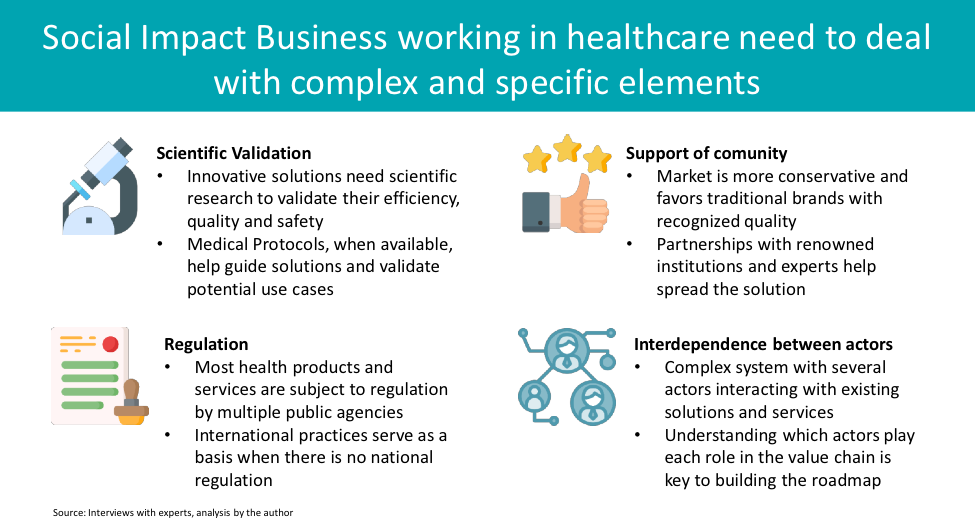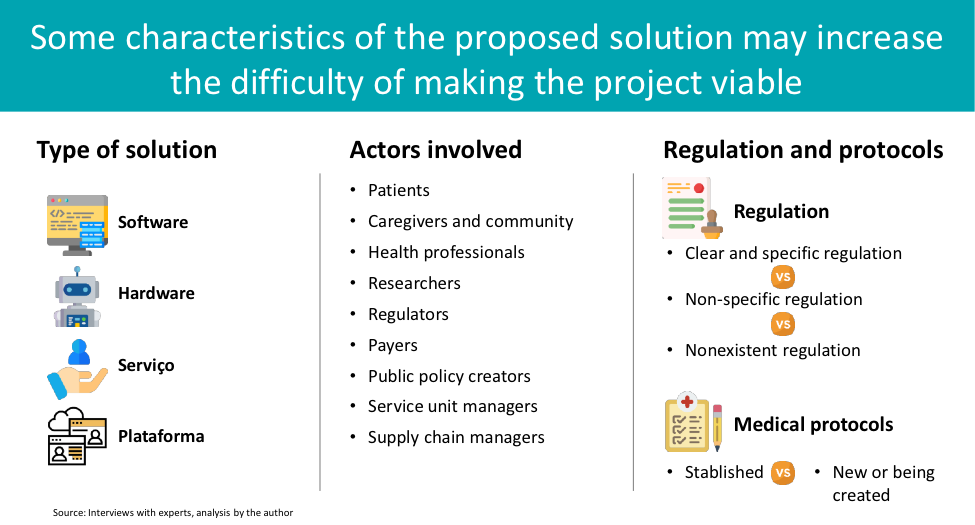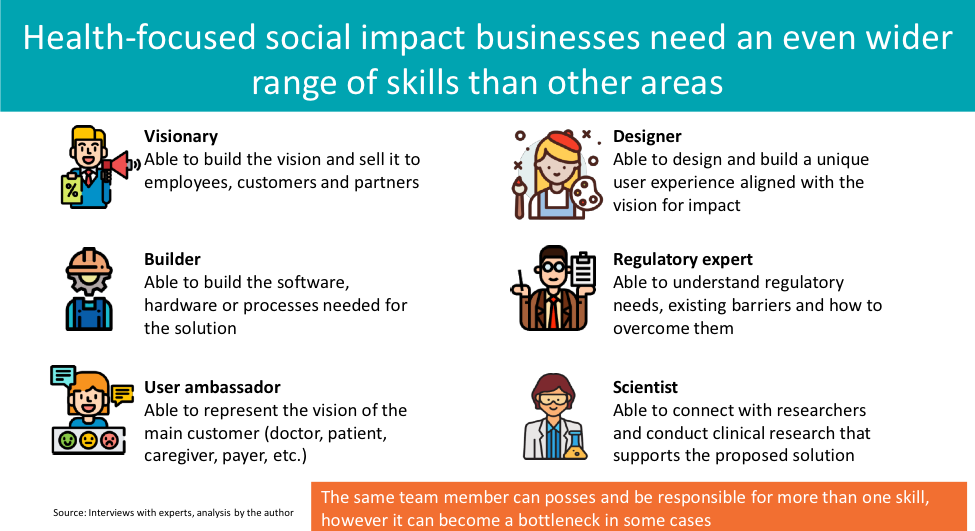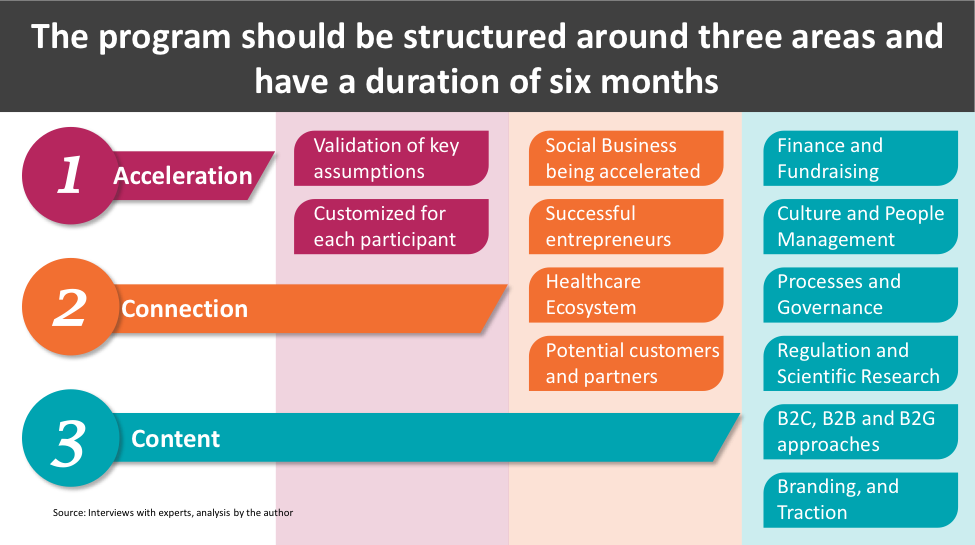IAP Fellow 2020: Artur Mendonca
Read Part I of Artur’s Fellowship experience here.
Read Part II of Artur’s Fellowship experience here.
Designing an Acceleration Program for Social Impact Businesses Focused on Healthcare
CHALLENGES OF SOCIAL IMPACT BUSINESS IN HEALTHCARE
Working with healthcare poses challenges and difficulties that other types of social impact businesses do not face. This happens mainly because these social businesses deal directly with human lives, so they need to have several safety validations. In general, the four elements that are unique to this sector are the necessity of scientific validation, regulatory constraints, backing from respected members in the healthcare community, and the ability to navigate the interdependencies of the sector.

These challenges can be even bigger depending on the type of solution proposed, the actors involved and specific elements of the related regulation. For example, services are some of the most traditional types of solutions, but they can be very expensive and not able to scale as easily as more innovative solutions that use software and hardware. However, these innovative solutions may face challenges related to regulation, and it can be more or less difficult depending on the user and the context of use.

SKILLS FOR SOCIAL ENTREPRENEURSHIP IN HEALTHCARE
Given the healthcare industry-specific challenges and requirements, different sets of skills appear in entrepreneurs that I have talked with. Most social impact ventures need three skills in its members: the ability to create and promote a vision, the ability to bring this vision into reality, and the ability to design the experience of the end-users. In healthcare, there are three other skills that are present in a considerable number of social impact businesses: the scientist, the regulatory expert, and the user ambassador.
Most often than not, innovative social impact business starts at the academia as the fruit of the founder’s research. Even when it is not the case, is very usual to have collaborations with researchers that can help validate the efficiency, quality, and safety of the proposed solutions. Kidopi is an example of Brazilian social impact business focused on healthcare that started during the co-founders PhD at the University of São Paulo.
Another common situation is when one of the founders suffered himself with the problem that now the social impact business is trying to solve. Having this user ambassador present from the start can drive a great impact because have lived the problem and understand nuances that can be really difficult for other people to grasp. One example of Brazilian social impact business focused on healthcare with a user ambassador is Laura Networks, that tries to diagnose sepsis in hospital environments using artificial intelligence and machine learning.
Finally, all the social impact businesses that I interacted with had to work with a regulatory expert at some point in their trajectory. For some of them, it was necessary when they were trying to scale their impact, for others it was crucial right from the start to get access to data and prove the efficiency of their approach.

STRUCTURE OF THE ACCELERATION PROGRAM
The structure of the acceleration program was one of the main deliverables of my project. Talking with other accelerators and social impact businesses that went through this type of program I was able to identify three main areas that they needed to help the social entrepreneurs: acceleration, connection, and content.
Acceleration should help validate key assumptions and build a roadmap for the solution. It needs to be customized to each participant and is probably the main component of the program – hence its name. Each social impact business will have one advisor, that should dedicate eight hours of work per week to each team of participants. The advisor should help steer their validation process and define bi-weekly goals so that they can keep track of how fast they are advancing.
Connection is also very relevant in the healthcare space as there are a plethora of actors interacting in several different ways. Therefore, the program needs to make sure that the participants are able to interact with each other, get to know successful entrepreneurs, traditional players from the healthcare ecosystem, as well as potential customers and partners.
Content and knowledge are key to help the social entrepreneurs navigate the growth of their ventures. The social impact businesses that are at this stage of development in general face similar problems and questions regarding big areas of knowledge. Given that, the idea is to provide them with workshops every two weeks with one specific topic.

CONCLUSION
The three weeks of my project with Artemisia during IAP were very intense and rewarding. Over the first week, I was able to immerse myself in their methodology and the types of problems that they were trying to solve in the healthcare space. In my second week, I interacted with several actors from the Brazilian ecosystem, which gave me a greater depth of understanding of the social entrepreneur’s day to day, how the existent acceleration programs worked, and how the government was trying to foster the development of innovative solutions for healthcare. In the third week, I was able to compile the learnings in presentations, spreadsheets, and mind-maps that will help Artemisia as they prepare to launch this program over the summer.
I personally learned a lot, met super interesting people, and had an amazing time during my period in Brazil. I am very thankful for the PKG Center and Artemisia to have proportionated this experience to me.
Tags: Brazil, Fellowships IAP 2020, Finance & Entrepreneurship, Health & Medicine, PKG Fellowships
